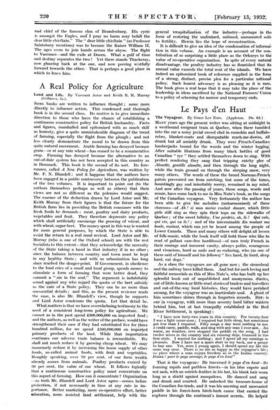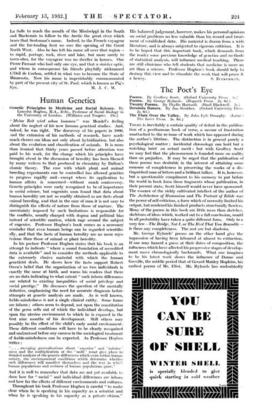Le Pays d'en Haut
The Voyageur. By Grace Lee Note. (Appleton. 10s. 6d.)
MANY years ago the present writer was sitting at midnight in a westbound emigrant train at Quebec, when there tumbled into the car a noisy jovial crowd clad in coonskin and buffalo- robes, blanket-coats and disreputable reach-Me-downs, all drunk but all amiably drunk. They were French-Canadian lumberjacks bound for the woods and the 'winter logging: After suitable libations from many black bottias of gol7d Canadian " rye " they settled themselves down to sing.. With perfect rendering they sang that tripping catchy glee of Alottelle, genii* alquette, and then through the long night, while the train ground on through the sleeping snow, very many others. The words of these the broad Norman-French patois prevented me from catching, but some of. the tunes, hauntingly gay and inimitably merry, remained in my mind. And now after the passing of years, those songs, words and music, have come back to me in Miss Nute's book, as the soni of the Canadian voyageur. Very fortunately the author has been able to give the melodies (unharmonised) of these chansons—of Ah ! si mon mine voulait denser, which little girls still sing as they spin their tops on the sidewalks of Quebec ; of the sweet lullaby, Une perdrix, oh, let ! Qui vole, qui vie, qui va /a ! ; and of the interminable En mutant ma bode, roulant, which can yet be heard among the people of Lower Canada. These and many others will delight all lovers of folk-music, while the book itself will hold those who like to read of gallant care-free hardihood—of men truly French, in their courage and innocent vanity, always polite, courageous and vivacious, hard as nails and as enduring, who (as one of them said of himself and his fellows) " liVe hard, lie hard, sleep hard, eat dogs."
. As a class the voyageurs are all gone now the steamboat and the railivay have killed them. And but for such loving and faithful memorials as this of Miss Nute's, who has built ap her splendid book out of unpublished and anonyrious, diaries, out of little-known or little-read stories of traders and travellera and out-of-the-way local histories, they would hive perished unsung, for the voyageur was an inarticulate soul. 460.4 of him, sometimes shines through in forgotten records. Here is one (a voyageur, with more than seventy hard bitter winters behind him, but at last tranquilly, established in the Red River Settlement is skslc.ing) " I have now forty-two years in this country. For twenty-Four I was a light canoe-man ; I required but little sleep, but sometimes got less than I required: Fifty songs a day were nothing to ma I could carry, paddle, walk, and sing with any man I oversaw. -No water, no weather, .over stopped the paddle or, the song. I lied twelve wives in the country and six running dogs, trimmed in -the first-style. I wanted for nothing ; gad spent 'all My earnings in pleasure. Now I have not a spare shirt to my back, our a penny to buy one. Yet, were I young again, I should spend my life the same way over. There is no life so happy as.the voyageur's life ; no place where a man enjoys freedom as in the Indian country. kitizza ! pour to pays eauvage, le pays d'en haul" That is the voyageur,- lie traversed le pays d'en hard—its foaming rapids and pathless forests—in his blue capote and red sash, with an ostrich-feather-in his hat, his black hair worn long as a shield against mosquitoes. He danced and sang and drank and courted. He unlocked the treasure-house of the Canadian fur-trade, and it was his unerring and unwearied paddle in his forest-born birch-bark canoe that carried the explorer through the continent's inmost secrets. 'He helped La Salle to reach the mouth of the Mississippi in the South and Mackenzie to follow to the Arctic the great river which bears that Scotsman's name. Indeed, to the French voyageur and the fur-trading Scot we owe the opening of the Great North West. Also he has left his name all over that region— to rapid, portage, rock, river and lake, but more rarely to town-sites, for the voyageur was no dweller in houses. One Pierre Portant who had only one eye, and that a sinister optic,. and whom in consequence his friends playfully nicknamed L'Oeil de Cochon, settled in what was to become the State of Minnesota. Now his name is imperishably commemorated by part of the present city of St. Paul, which is known as Pig's.







































 Previous page
Previous page